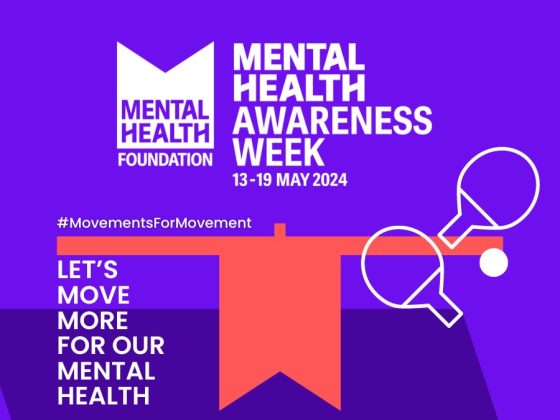Welcome back to the North East Area Blog, Mental Health Awareness Week 2024 took place from 13th to 19th May and the spotlight once again turned to the importance of mental well-being in our daily lives. In recent years, there has been a growing recognition of the need to prioritise mental health, and various activities and initiatives have emerged to support individuals on their mental health journeys.
Table tennis is proving to be much more than just a game. Beyond its physical benefits, such as improved coordination and cardiovascular health, table tennis has a profound impact on mental health and here are a few accounts on how table tennis has helped some people from the North East:
Christine – Durham
At the age of 70 I began the painful and traumatic experience of ending my 20-year marriage. […] I moved to a new area where the only people I knew were my son and his family. My mental state was poor, and I had lost all my confidence. Dropping my grandson off at Beavers one night I noticed a poster about a Woman’s and Girls table tennis group. I hadn’t played table tennis since my early 20’s but plucked up the courage to go to a session. This group were so friendly and welcoming and more importantly I felt safe. It was quite a magical experience. I had two hours where I forgot all my problems. I was just focused on hitting the ball. Not only has my confidence improved so has my mental health.
Hilary – Durham
Thirteen months of weekly table tennis after a gap of 50 years and I have recovered bits of ME that I had lost or forgotten. A warm welcome from a group of female players and new friendships began. The fun, laughter and activity, as a member of the group, give me new energy and boost my self-esteem. I love the release from a good forehand smash!
Colin – Bradford
[If I’m ever] going through stress/anxiety because of studies and work, playing table tennis [has helped] my mental health as it [takes] my mind off things and I [can] enjoy playing with friends and family, and pulling off trick shots.
Ann – Durham
I was widowed over 16 years ago and then a few years later the school and community centre where I worked closed, and I ended up feeling very depressed and lonely. I started doing a lot of voluntary work to get out of the house and meet people. I received a call from Chris Leishman who at the time was Chairman of Brandon Community Association asking if I could help them out.
When I was at the hall one day, I noticed Ladies playing Table Tennis and was told I could go along and give it a try. I turned up the next week and […]it changed my life, it really is inspirational. [I was] made welcome from the minute I stepped through the door I now live for a Thursday morning. My younger sister Lynn has also joined, and we’ve rekindled our childhood [where] we were inseparable and it’s like that again laughing and having fun.
My mental health has improved beyond doubt and even my grandchildren now come around to play table tennis on my dining room table.
Isabella – Bradford
It gives me another focus for when I’m stressed, something to put all my effort into to distract myself from anything that’s bothering me.
Sarah – Yorkshire
“To be able to exercise whilst having fun and making friends makes it the perfect activity. Everyone attending the class seems to have a permanent smile on their face no matter what level their ability and skill, their exuberance always shows through.”
Members of the Parkinson’s group have been surprised at what they have been able to achieve. Many of them started with low expectations of their ability so it has helped their self-confidence and self-belief.
Chris – Ackworth
Table Tennis is a great sport for getting people of all ages involved. It is a great way to meet people.
This year for Mental Health Awareness week the theme is Movement: Moving More for our Mental Health, so why not encourage other people you know to come along and play table tennis, whether this is to a bat and chat session, in a Ping Pong Parlour or even on your local outdoor table. 1 in 4 people will experience mental health problems each year in England and 1 in 6 people report experiencing a common mental health problem like anxiety or depression in any given week in England so it really important to raise awareness about mental health and to get more people talking.
If you need help, then there are a number of support services that you can reach out to (which are all free);
- Samaritans or call 116123
- Text SHOUT to 85258
- Switchboard (The national LGBTQIA+ support line) – call 0800 0119 100
- The Mind website can help you to identify the best crisis service for you.


